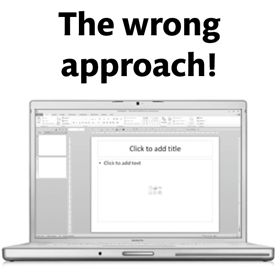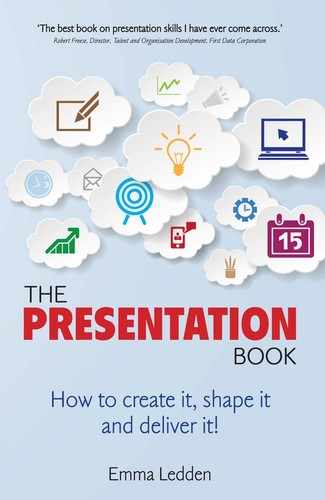Introduction
90 per cent of the success of your presentation is determined before you stand up in front of your audience.

To be a successful, impactful presenter there are three steps you must take before you stand up and present to your audience.
- You must profile your audience.
- You must structure and shape your messages.
- You must design visual aids.

I have worked with thousands upon thousands of businesspeople from interns to CEOs, from accountants to zoologists. I have not met one single person who takes this approach.
This is the typical approach to presentations that I see:
- The slides are prepared first: Steps one and two, profiling the audience and structuring and shaping the messages, are not even considered. In preparing their presentation, most presenters open their laptop and start typing data onto their slides, believing this is the only step in the process of preparing a presentation. The truth is this is fundamentally destroying your chance of being an effective presenter before you have even begun.
- There is no difference between the handout and the slides: Presenters will regularly prepare a handout which they will then use as their slides and also as their notes. In reality a handout, a visual aid (slides) and your notes have three completely different purposes and all need to be prepared separately.
- Lack of preparation: Because of the above approach presenters have not prepared to talk to their audience. They have prepared to talk at their audience. They have prepared to dump data. They have written that data onto their slides. Very often this is every single word they are going to speak in case they lose their way. Plus the slide is also doubling up as the handout so it needs all the information. The presenter is now:
- speaking the written word;
- delivering a whole heap of information with no clear messages;
- following a structure dictated to them by their slides rather than their own natural way of thinking.

The truth about presenting
‘I have to be honest with you before we go any further. Every single day I meet intelligent, educated and confident businesspeople who are letting themselves down when they stand up to make a presentation.’
Being recognised as the expert does not mean you are an expert presenter
You can be the world’s leading expert in your field. You can have a BA, MA and PhD. You can be a leader in a great organisation with expertise and knowledge superior to anyone else. What all this means is you have good information, maybe even really great information. It does not mean, however, that you have the ability to present your information to an audience in an engaging and understandable way. Knowing something (having plenty of information) and delivering structured, sharp messages to an audience are two totally different skills.
Your feelings of comfort are not an indicator of how good a presenter you are
If you are at a place where presenting feels comfortable for you, I think that is great. If you believe in yourself I believe there is nothing greater. However, the truth is that feelings of confidence and comfort are not evidence you are a good presenter. In fact they could be getting in your way and blinding you to the reality of your presentation skills. The question is not whether you are confident and feel good. The questions you should be asking are:
- Did I engage my audience?
- Did I answer the one question my audience really needed?
- Did I structure my information so it was easy to follow?
- Did I get my point across in two words, in 200 words, or did I get it across at all?
- Did I design my visual aids to have impact for my audience?
A great presentation is not about you, your comfort or your expertise. It’s about your audience.
The first question you have to ask yourself
The first question you have to ask yourself even before you read on is – do you want to be a great presenter? Maybe you are happy being an average presenter, the same as everyone else you see. They get away with it, don’t they? Surely you can too. Being a great presenter is not easy and it requires commitment and work. Do you see the value in presenting enough to put that work in?
In the mind of the presenter
I did a one-to-one presentations skills coaching session with an engineer working in a Europe-wide organisation who presents himself to hundreds of people weekly. He was telling me about his experience and his challenges when presenting. Although he was talking about nerves and a lack of experience I was not convinced this was his problem.
After I listened to him speak for a while I asked him if he saw the value in presenting. ‘No,’ he said. ‘Presenting is pointless and a waste of my time.’ I was really shocked by his reply. I genuinely couldn’t believe there was a person in business today who didn’t recognise how important presentations are.
So what is the value in presenting skilfully?
No matter what you do for a living, no matter what industry you are in and no matter what level you are at (pre-manager, manager or senior executive) you have to do some form of:
- presenting to inform/educate;
- presenting to persuade/influence;
- presenting to ignite/motivate;
- presenting to sell.
Presentation skills are critical to the success of a business. Without presentation skills, individuals are held back and businesses falter.
Every time you stand up in front of an audience, whether that is two people or 200 people, you are selling yourself, your message, your product or service. While you are doing this the audience is sitting there judging you. That judgement can be either positive or negative but there will be a judgement. You will have an impact on every audience you stand in front of. You will leave them trusting you or rejecting you based on your presentation.
A great presentation can get you promoted, win you million-pound business deals or at the very least consistently present your credibility and expertise.
A bad presentation can lose you job opportunities, handicap your ideas and tell your audience you don’t know your topic or worse you don’t care.
There are very real consequences to not presenting well. You will severely limit your career potential and you will lose business. That is a guarantee.

- a CEO you must inspire, motivate and lead with your words (having the job title and position is not enough to make them listen to you);
- a sales person you must convince someone to buy your product or service (the trick is to stop selling your product and start educating them on their problem and how your solution can help them);
- a consultant you must influence a room to follow your processes (you must find a way to explain these very complex approaches simply);
- an academic you must condense your 500-page report into clear findings (no one cares how you got there … sorry);
- a solicitor you have to make the law understandable (not easy when all your audience wants to know is how much will I be fined and will I go to jail if I don’t pay it);
- an accountant you must put the 100 numbers on your spreadsheet into context (all your audience wants to know is what is the bottom line);
- a teacher/lecturer you must explain abstract concepts and theories to a room full of students so they can pass their exams (and that is on top of getting and keeping their attention);
- a graduate/trainee/intern you are at the beginning of your career, trying to prove yourself; you must showcase your ability to take something complex and make it simple (the biggest challenge is you are only getting to grips with it yourself).
In business today no matter what your job title the ability to present a message to a group of people is something everyone has to do in one form or another.
The reality is engineers don’t just deal with machines and models, accountants don’t just deal with numbers and solicitors don’t just deal with legislation. They need to present to their co-workers and managers. They need to go out into the world and present themselves and their ideas to their clients, industry groups and regulatory agencies.
They need to know how to present with impact to do this effectively.
For a presenter to succeed he or she must figure out how to get the information out of their mind to the people in the audience in a way they will understand, remember and even act on. This is the skill of presenting. This is the skill you may not have been taught despite graduating from a top university, having a 25-year career under your belt or acquiring a very impressive job title.
Great presenters are created, not born.
The good news is you are not as bad as you think you are; you probably just need to work harder at it.
The bad news is you are not as good as you think you are; you definitely need to work harder at it.
You know who you are … at least I hope you do.

